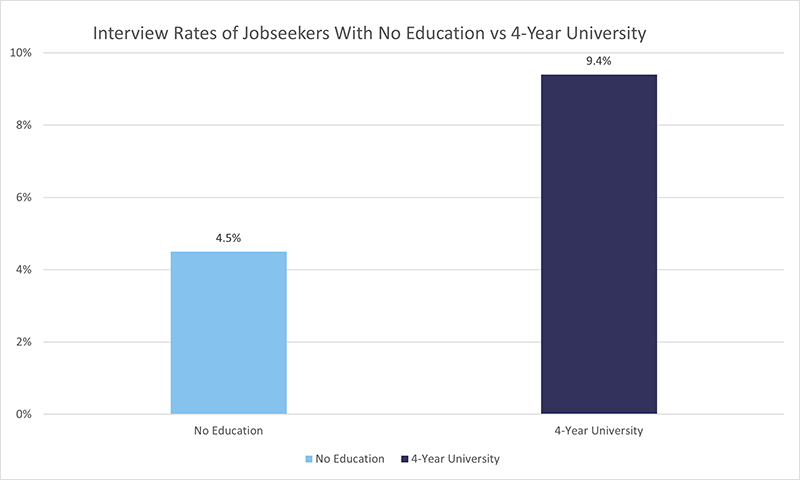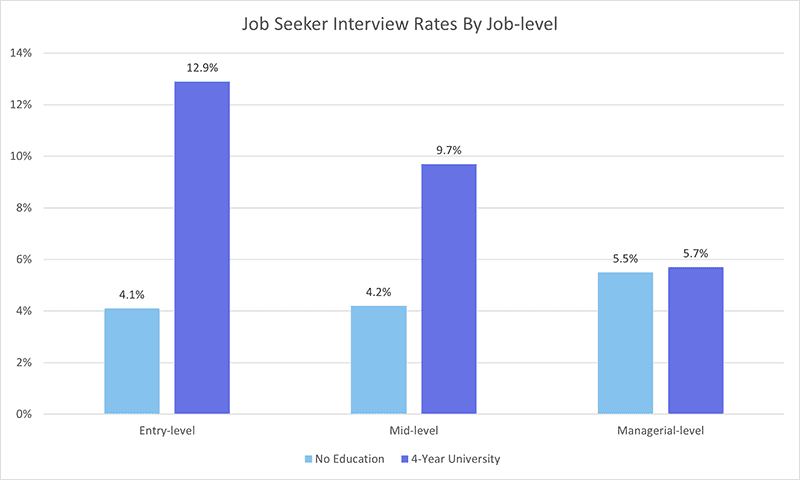Resume Experiment: Just How Valuable Is A College Education?
To gauge the value of a 4-year college education from the perspective of employers, we compared the success rates of resumes that are almost exactly identical, with the only difference being the level of education listed.

Applicants who list a 4-year university on their resume received over twice as many job interviews as those who didn’t
College tuition has been rising year after year, outpacing both wage growth and inflation. This has made college increasingly difficult to afford for many students, and naturally more and more people are questioning the value of a degree from a four-year college or university. The continued growth of the world wide web has also contributed to this mindset, as one can find countless videos, lectures, and other resources on just about any topic online at no charge whatsoever. Furthermore, many of the largest companies in the world are now publicly stating that they do not require job applicants to have a college degree. To assess precisely how much significance possessing a college degree has on the job search process, ResumeGo decided to conduct a field experiment in which we applied to a total of 6,000 job openings and compared the success rate of resumes that listed a college degree with the success rate of resumes that didn’t.Methodology
A total of 30 fictitious job applicants were created, each one based on a real-life person. These fictitious job applicants worked in a variety of different industries. One third of these applicants had minimal work experience (0-1 years), one third of these applicants had a medium level of work experience (6-8 years), and one third of these applicants had extensive work experience (20-25 years). Each applicant also went to a different 4-year university. The pool of universities used was chosen at random from a list of the top 200 largest universities in the United States based on enrollment figures. For each job applicant, we wrote two resumes that were identical, except one listed a bachelor’s degree from a 4-year university while the other one did not mention any degree at all. We then submitted each resume to exactly 100 distinct job openings, for a total of 6,000 submissions. Resumes for applicants with minimal work experience were only submitted to entry-level job openings, resumes for applicants with a medium level of work experience were only submitted to mid-level job openings, and resumes for applicants with extensive work experience were only submitted to upper managerial-level job openings.Results
For each of the aforementioned resume submissions, we noted down whether the corresponding employer offered a job interview to the applicant in question. Employers were given 30 days to respond. We then counted the total number of interview offers that resumes listing a bachelor’s degree received, as well as the total number of interview offers that resumes which did not list any degree received. In aggregate, we discovered that resumes listing a bachelor’s degree received an interview offer 9.4% of the time, while resumes which did not list any degree received an interview offer 4.5% of the time.
We also divided up the resume submissions among those submitted to entry-level jobs, those submitted to mid-level jobs, and those submitted to managerial-level jobs. We then repeated the above comparison for each of these 3 categories:
In aggregate, we discovered that resumes listing a bachelor’s degree received an interview offer 9.4% of the time, while resumes which did not list any degree received an interview offer 4.5% of the time.
We also divided up the resume submissions among those submitted to entry-level jobs, those submitted to mid-level jobs, and those submitted to managerial-level jobs. We then repeated the above comparison for each of these 3 categories:
 From these results, we see that in each of the 3 categories, resumes listing a bachelor’s degree received an interview offer more often than resumes which did not list any degree. The difference in number of interview offers received was the largest for resume submissions to entry-level jobs, and smallest for resume submissions to managerial-level jobs.
From these results, we see that in each of the 3 categories, resumes listing a bachelor’s degree received an interview offer more often than resumes which did not list any degree. The difference in number of interview offers received was the largest for resume submissions to entry-level jobs, and smallest for resume submissions to managerial-level jobs.
Conclusion
From the results of our field experiment, we see that job applicants with a bachelor’s degree from a 4-year college or university have a modestly higher chance of receiving an interview offer than job applicants without such a degree, all else being equal. We also see that listing a bachelor’s degree on the resume makes the biggest difference for entry-level jobs, and makes the least difference for managerial-level jobs. It may be the case that employers who post managerial-level job openings focus much more on recent work accomplishments than prior academic performance, which makes intuitive sense. We acknowledge that this difference may vary across industries, but we did not examine this factor in our study for the sake of simplicity. Whether or not the higher chance of receiving an interview justifies the financial cost and time involved in attaining a bachelor’s degree is up to each individual to decide for themselves. Of course, the benefits of going to a 4-year college go far beyond increasing the likelihood of getting a particular job. Attending college lays the groundwork for a person’s career and equips them with the knowledge necessary to excel in the workplace and in life.Are you a hiring professional? Share your expertise!
More surveys are to come and the more insight the better. We’re welcoming recruiters and hiring professionals to shed light on their hiring habits and preferences.


See other resume research we’ve done.
Data is used for everything, so why not for resume writing? See more surveys and field experiments we’ve conducted over the years that have influenced the way resumes and other job documents are written.
More resources for your resume and job search
Whether you’re a career expert or a total beginner, there’s always more to learn. Use these resources to level up your resume and build your career.


